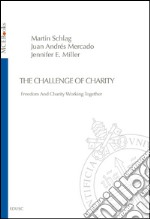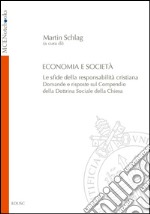Martin Schlag eBooks
eBooks di Martin Schlag di Formato Epub
Martin Schlag è nato a New York City nel 1964, cittadino americano ed austriaco. Si è laureato in giurisprudenza presso l’Università di Vienna. È dottore in legge (1989) e in teologia (1998). Avvocato e teologo, è stato ordinato sacerdote della Prelatura dell’Opus Dei nel 1996. Dopo aver svolto lavoro pastorale a Vienna, dal 2008 è professore di Dottrina Sociale della Chiesa presso la Pontificia Università della Santa Croce. Nel 2012 è stato nominato Consultore del Pontificio Consiglio Giustizia e Pace.
Nella collana MCE Books ha già pubblicato il libro "La dignità dell’uomo come principio sociale" (Roma 2013).
La dignità dell'uomo come principio sociale. Il contributo della fede cristiana allo Stato secolare. E-book. Formato EPUB Martin Schlag - Edusc, 2015 - Mcebooks
La convinzione che tutti gli uomini nascano liberi e uguali per dignità appare nella Dichiarazione Universale dei Diritti dell'Uomo del 1948, ed è stata da allora accolta in numerose costituzioni e trattati internazionali. Il concetto di dignità umana ha la funzione di una formula inclusiva, che coinvolge tutti gli uomini ponendoli sullo stesso piano e crea una simmetria tra lo Stato e l'individuo inteso come persona. Questa idea di dignità dell'uomo, pur avendo radici precristiane ed extracristiane, si deve in primo luogo al cristianesimo. Il libro intende prendere in esame il contributo specificamente cristiano all'idea moderna di dignità dell'uomo nello Stato secolare, analizzando il sacro deposito della rivelazione di cui si nutre la fede: la Bibbia e i testimoni privilegiati della Tradizione, i Padri della Chiesa.
The Challenge of Charity: Freedom And Charity Working Together. E-book. Formato EPUB Martin Schlag - Edusc, 2015 -
Introducing charity as a social principle valid not only for the micro-relationships like the family or friendship but also for the macro-relationships like the economy or politics, poses a challenge, because charity, as the central message of the Gospel and the distinguishing Christian virtue, is not a directly applicable social program. It requires the mediation both of a correct political philosophy and of a social organization based on legal justice. However, charity is difficult to handle in organizations because the exigencies of charity go beyond justice and are difficult to predict. Love (charity, benevolence, etc.) gives without return, without calculation. Love transcends the loving person and therefore cannot be forced into a socio-legal structure that needs regularity and predictability in order to function. This then is the challenge for Christians striving to evangelize the society in general and the economy in particular: Charity is the hallmark of Christian ethics, but is not fit to function as an immediately applicable social principle. Christians therefore struggle to find the way that charity can manifest itself institutionally in a free market economy. This book is a result of such an endeavor. We ask in which way the big social principles of human dignity, solidarity and subsidiarity as they have been developed in centuries of Catholic social thought and magisterial teaching express charity as a principle in society, and how solidarity is compatible with freedom and spontaneity. Martin Schlag. Born 1964 in New York, USA. 1991 Doctor iuris at the University of Vienna. 1996 priestly ordination in the Prelature of Opus Dei. 1998 Doctor Theologiae at the Pontifical University Santa Croce. Since 2008 full professor for social moral theology at the same University. 2012 appointment as Consultant to the Pontifical Council for Justice and Peace. Numerous publications. His last book, edited together with Domènec Melé, appeared in Springer under the title “Humanism in Economics and Business. Perspectives of the Catholic Social Tradition”. Juan Andrés Mercado. Assistant Professor (1996-2002) and Associate Professor (2003- 2013) of History of Modern Philosophy at the Pontifical University of the Holy Cross. Full Professor of Applied Ethics (2014) at the same University. Founded “MCE - Markets, Culture and Ethics Research Centre”. Visiting Professor at IPADE Business School (Mexico City). Jennifer E. Miller. Cajun by birth, Dr. Jennifer E. Miller has studied at the Pontifical Universities of the Angelicum and the Gregorian, as well as at the John Paul II Institute for Studies on Marriage and Family in Rome, obtaining her doctorate with a thesis in moral theology at the Pontifical University of the Holy Cross. She has taught courses on moral theology and business ethics in the United States and in Italy. Currently Directress of Studies at the Markets, Culture and Ethics Research Centre at the Pontifical University of the Holy Cross, Dr. Miller’s principle areas of research are the economy and the family.
Economia e società. E-book. Formato EPUB Martin Schlag - Edusc, 2015 - Mcenotebooks
Il Compendio della Dottrina Sociale della Chiesa è stato pubblicato dal Pontificio Consiglio della Giustizia e della Pace nel 2004 e da allora è stato tradotto in più di trenta lingue. Si è dimostrato uno strumento pastorale utile per diffondere l'insegnamento sociale della Chiesa. Questo libro vuole offrirne una sintesi, al fine di renderne più accessibile il contenuto. Allo stesso tempo gli autori hanno inserito idee tratte dai nuovi documenti dell'insegnamento sociale dei pontefici. Il titolo del libro esprime l'ineludibile responsabilità di ognuno verso la società in cui vive. '[...] sarebbe assai utile un compendio o una sintesi autorizzata della dottrina sociale cattolica, compreso un 'catechismo', che mostri la relazione esistente tra di essa e la nuova evangelizzazione' (San Giovanni Paolo II, Esortazione Apostolica Ecclesia in America, 54).


